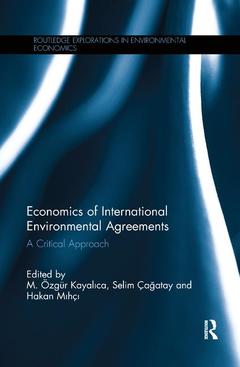Economics of International Environmental Agreements A Critical Approach Routledge Explorations in Environmental Economics Series
Coordonnateurs : Kayalıca M. Özgür, Çağatay Selim, Mıhçı Hakan

International environmental agreements provide a basis for countries to address ecological problems on a global scale. However, countries are heterogeneous with respect to their economic structures and to the problems relating to the environment that they encounter. Therefore, economic externalities and global environmental conflicts are common and can cause problems in implementation and compliance with international agreements.
Economics of International Environmental Agreements illuminates those issues and factors that might cause some countries or firms to take different positions on common problems. This book explores why international environmental agreements deal with some problems successfully but fail with others. The chapters address issues that are global in nature, such as: transboundary pollution, provision of global public goods, individual preferences of inequality- aversion, global cooperation, self-enforcing international environmental agreements, emission standards, abatement costs, environmental quota, technology agreement and adoption and international institutions. They examine the necessary conditions for the improved performance of international environmental agreements, how cooperation among countries can be improved and the incentives that can be created for voluntary compliance with international environmental agreements.
This text is of great importance to academics, students and policy makers who are interested in environmental economics, policy and politics, as well as environmental law.
Introduction
Part I Stability: External and Internal
1. What Drives Compliance with International Environmental Agreements? A Political Economy Analysis of International and National Determinants
Sarah Al Doyaili and Leo Wangler
2. Stable Environmental Agreements and International Trade In Asymmetric Oligopoly Markets
Michel Cavagnac and Guillaume Cheikbossian
3. The Effects of Inequality Aversion on the Formatıon of Climate Coalition: Theory and Experimental Evidence
Yu-Hsuan Lin
Part II Heterogeneous Countries
4. Transnational Environmental Agreements with Heterogeneous Actors
Achim Hagen, Leonhard Kähler and Klaus Eisenack
5. International Trade and Environmental Cooperation among Heterogeneous Countries
Soham Baksi and Amrita Ray Chaudhuri
6. The Effects of Labor Intensity and Pollution Damage on Government Policies and Location Choice
Benan Zeki Orbay and Narod Erkol
Part III Firm Heterogeneity
7. Foreign Penetration and Environmental Policies
Sajal Lahiri and Yingyi Tsai
8. Abatement Level in Environmental Agreements when Firms are Heterogeneous in Abatement Cost
Luis Gautier
9. Environmental Quota in an Asymmetric Trade Competition with Heterogeneous Firms
Rafael Salvador Espinosa Ramirez and M. Özgür Kayalıca
Part IV Environmental Technology
10. The Effectiveness of International Technology Agreements for Environmental Issues: The Impacts of R&D Costs
Chisa Kajita and Toshiyuki Fujita
11. Adaptation Technology and Free-Riding Incentives in International Environmental Agreements
Hassan Benchekroun, Walid Marrouch and Amrita Ray Chaudhuri
12. Cooperation in Environmental
M. Özgür Kayalıca is a professor of Economics at Istanbul Technical University, Turkey. One of his main research interests is environmental economics, especially the environment and trade issues, with game theoretic applications.
Selim Çağatay is a professor of Economics at Akdeniz University, Turkey. His research focuses on sustainable development, migration and applied policy analysis.
Hakan Mıhçı is a professor of Economics at Hacettepe University, Turkey. One of his main research interests is development economics, especially human development and environment-related issues.
Date de parution : 12-2019
15.6x23.4 cm
Date de parution : 03-2017
15.6x23.4 cm
Thème d’Economics of International Environmental Agreements :
Mots-clés :
Marginal Abatement Cost; Self-enforcing IEAs; Environmental Economics; BTAs; International Organisations; Non-cooperative Equilibrium; Coalition Theory; Ita; Development Economics; Global Energy Governance; Ecological Economics; Producer Surplus; International Economics; Abatement Cost; Game Theory; IRENA; Selim Çağatay; Competition Advantage; Hakan Mıhçı; Cooperative Equilibrium; Michel Cavagnac; North Firm; Guillaume Cheikbossian; Transboundary Pollution; Yu-Hsuan Lin; IEA; Soham Baksi; Climate Clubs; Amrita Ray Chaudhuri; Pollution Quotas; Narod Erkol; Labour Intensity; Luis Gautier; Grand Coalition; Rafael Salvador Espinosa Ramírez; Coalition Formation Game; Hassan Benchekroun; Marginal Disutility; Walid Marrouch; NCE; Merve Kumaş; International Energy Regime; Gülgün Kayakutlu; Coalition Structure; Onur Tutulmaz; Emission Tax; Sarah Al Doyaili-Wangler; International Energy Governance; Leo Wangler; Achim Hagen; Leonhard Kähler; Klaus Eisenack; Sajal Lahiri; Yingyi Tsai; Chisa Kajita; Toshiyuki Fujita; Yasemin Atalay
